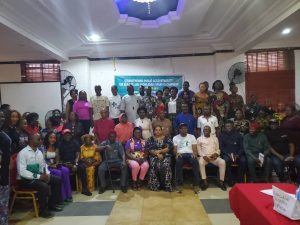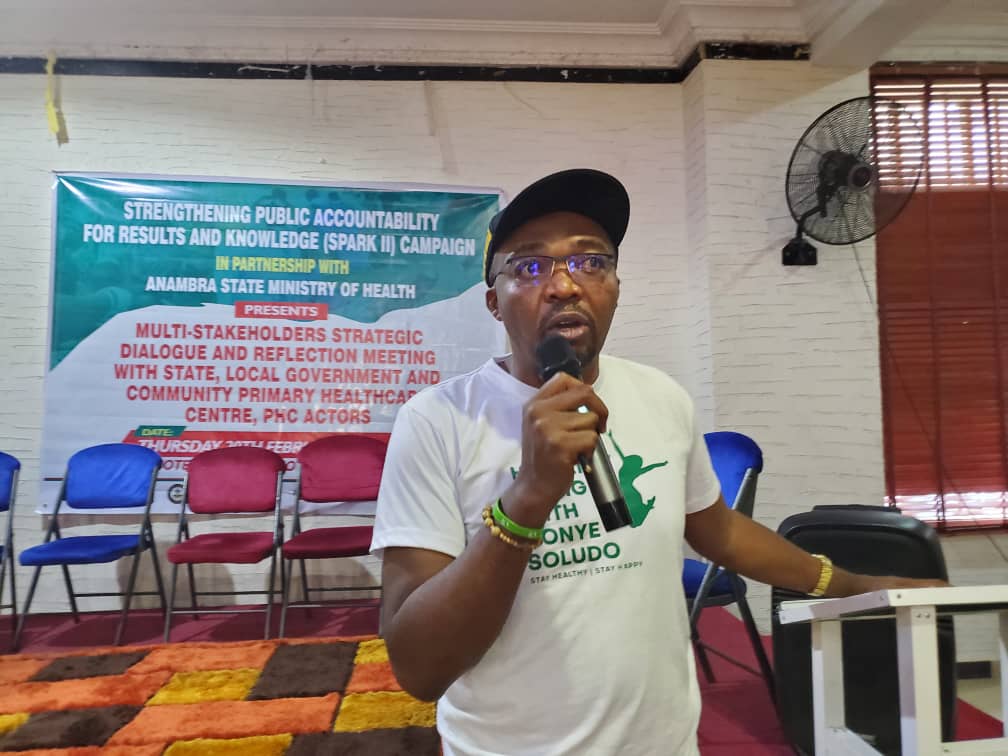Lawrence Nwimo, Awka
Anambra State Government has issued a stern warning to underperforming nurses in Primary Healthcare Centres (PHCs) across the state, threatening to sack nurses found wanting in their duties.
Commissioner for Health, Dr. Afam Obidike, handed down the warning during a multi-stakeholder strategic dialogue and reflection meeting with state, local government and community primary healthcare centre, PHC actors.
The one-day multi-stakeholder meeting was part of the Strengthening Public Accountability for Results and Knowledge (SPARK II) project implemented by Justice Development and Peace Caritas (JDPC Nnewi) in collaboration with Community Empowerment Network (COMEN) and Civil Right Concern (CRC) in the state.
Dr. Obidike, who addressed the forum, lamented the poor attitude and substandard performance of some nurses in the PHCs, stressing that the government would no longer tolerate any form of negligence or incompetence.

He emphasised that the state government has invested heavily in the health sector and expects nothing but the best from healthcare workers, particularly nurses who are at the forefront of primary health care delivery.
“We’ve made significant investments in healthcare, and now it’s time to assess and monitor progress. Our goal is to ensure Primary Healthcare Centres (PHCs) are fully operational, and any underperforming staff must either resign or face sack.
“This is a matter of accountability, as it’s unacceptable for the government to spend millions on salaries without seeing tangible results. With over 3,000 nurses, 1,000 Community Health Extension Workers (CHEWs), and 100 doctors awaiting employment, we expect our current staff to deliver quality services. Those who are not willing to work will be sacked instantly,” he said.
Executive Secretary of Anambra State Primary Healthcare Development Agency (ASPHCDA), Pharm. Chisom Uchem, urged nurses in various healthcare centers to improve their performance in order to enhance healthcare delivery in the state.
Uchem said the State government is committed to making Primary Healthcare Centres (PHCs) functional, with general hospitals now established in all 21 Local Government Areas (LGAs). She said the general hospitals now serve as hubs for the state’s innovative telemedicine services, noting that each facility has now been equipped with solar power and 24-hour electricity supply.
She said 42 doctors across the LGAs have already received gadgets and devices, and that the government will provide data and distribute routers to facilitate their work and response to patients’ demands.
Some of the stakeholders who spoke at the meeting advocated for increased collaboration and coordination among various key actors for improved healthcare delivery particularly at the local level.
Chairman, Local Government Supervisory Councillors, Dr Nkem Okeke, emphasised the importance of community engagement in enhancing healthcare delivery. He urged Ward Development Committees (WDCs) to strive to bridge gaps between healthcare workers and community members. He added that they must take up their roles in mobilising stakeholders to address PHC challenges.
During her presentation entitled: “Enhancing Understanding of System Change in MCH Service Delivery and Budget Analysis,” Mrs Ugochi Ehiahuruike, IBP SPARK II COMEN Consultant, said health sector remains one of the most critical in the government’s blueprint agenda, but regretted that allocation to the health sector has consistently fallen short of the Abuja declaration’s 10 percent benchmark.
presenting the data, Ugochi said the state’s health sector, in 2021, received N10.1 billion, which was 7.1% of the total budget of N143.6 billion. The following year, she said the allocation decreased to 6.79% of the total budget.
Ugochi said the sector, in 2023 received 4.28% of the total budget, while in 2024, received 5.47%. She also said in 2025, the health sector’s allocation is N35.3 billion, which is 5.82% of the total budget of N606.9 billion.
Executive Director of Civil Rights Concern (CRC), Okey Onyeka, presented a quarterly budget performance of the Health Ministry for the purpose of transparency and accountability.
Onyeka who called on citizens to familiarise themselves with the resources at the disposal of the government for constructively engagement with the duty bearers, charged members of Community Empowerment Network (COMEN) and WDCs to work assiduously towards bridging the gaps in government efforts and interventions in the sector.
Director of JDPC Nnewi, Rev Fr Ben Okolo, explained that the SPARK 2 project is dedicated to advancing Maternal and Child Healthcare (MCH) and enhancing service delivery at Primary Healthcare Centres (PHCs) throughout the state.
He said the objective was to enhance system change, address access barriers, strengthen financial oversight, co-create inclusive solutions and establish sustainable communication for effective service delivery.

